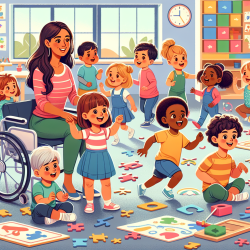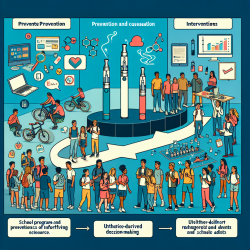In the dynamic world of early childhood education, the integration of structured motor programs in inclusive classrooms is a topic of significant importance. The research article, Exploring the Perspectives of Preschool Teachers on Implementing Structured Motor Programs in Inclusive Classrooms, provides valuable insights into the perceptions of preschool teachers regarding these programs. This blog aims to translate these findings into actionable steps for practitioners, thereby enhancing their skills and encouraging further research in this vital area.
Key Findings from the Research
The study involved semi-structured interviews with 17 preschool teachers who shared their views on structured motor programs. The results revealed three main themes:
- Value of Structured Motor Programs: All participants acknowledged the importance of structured motor programs, highlighting benefits such as enhanced physical movement, social skills, and motor skill development.
- Current Motor Activities: Many teachers reported a lack of a designated motor curriculum, relying instead on outdoor recess and indoor activities like YouTube videos and dance CDs.
- Concerns About Implementation: Teachers expressed concerns about their ability to implement structured programs correctly, the additional workload, and the potential for these programs to replace free play.
Implications for Practitioners
Based on these findings, here are some actionable steps for practitioners:
1. Recognize the Importance of Structured Motor Programs
Structured motor programs are essential for developing fundamental motor skills in preschoolers, especially those with disabilities. These programs provide targeted opportunities for children to learn and practice motor skills, which are crucial for their overall development.
2. Balance Structured and Unstructured Activities
While structured motor programs are beneficial, it is equally important to provide opportunities for unstructured play. A balanced approach ensures that children receive the benefits of both types of activities, supporting their physical, cognitive, and social-emotional development.
3. Invest in Professional Development
Professional development is key to equipping teachers with the knowledge and skills needed to implement structured motor programs effectively. Training should focus on motor development, the importance of physical activity, and practical strategies for integrating motor programs into the curriculum.
4. Develop and Use Research-Informed Motor Curricula
Teachers need access to high-quality, research-informed motor curricula that are developmentally appropriate for preschoolers in inclusive classrooms. Such curricula should be flexible enough to be implemented in various settings, both indoors and outdoors.
Encouraging Further Research
While this study provides valuable insights, further research is needed to explore the implementation of structured motor programs on a larger scale. Future studies should investigate the long-term impact of these programs on children's development and identify best practices for integrating them into early childhood education.
To read the original research paper, please follow this link: Exploring the Perspectives of Preschool Teachers on Implementing Structured Motor Programs in Inclusive Classrooms










